SPOILERS BELOW. DUH.
Over here in the States, the season 8 premiere of Doctor Who was book-ended by live specials hosted by Chris Hardwick (“Points!”) because, well, insert joke about Hardwick hosting geek TV show after specials. As is his way, Hardwick used the specials to encourage fans to take to Twitter to share their #NewToWho stories of how they first got into Doctor Who, although the only Tweets they read live on air seemed to all be “started with Matt Smith, marathoned previous Doctors after that.” That’s not surprising since the show has exploded in popularity since Smith first walked on the scene and declared his love for fish fingers and custard. However, this means that for many fans “Deep Breath” was their first real time experience of adjusting to a new Doctor as opposed to simply binge-watching the Eccleston/Tennant and Tennant/Smith transitions on Netflix (or wherever else the show is found). This was actually my second crack at it, though.
My #NewToWho Story

Roughly what the Ryan Adams concert looked like
My #NewToWho story mostly entails a best friend forcing me to watch the first couple of Eccleston episodes since we had time to kill in a hotel room while waiting to see Ryan Adams in concert. So, I owe my fandom to her handy-dandy portable DVD player, and lust for David Tennant (he just looked so dreamy on the cover of the season 2 DVD box set) inspiring her own Doctor Who fandom in the first place. By that point, the first 3 seasons of the revived show were already out on DVD, and I knew going in that at the end of the first season the guy playing the Doctor changed into a different actor, kind of like if the 007 movies actually had an in-universe explanation for why James Bond frequently changes his appearance. Even so, I took Eccleston’s regeneration pretty hard. He was my first Doctor, and he was, as he put it, “Fantastic!” So, who the heck was this new guy and his “Barcelona!” and flaky grin? It sure didn’t help that I was watching these episodes (Eccleston’s last, Tennant’s first) with my friend whose outright love and lust for anything remotely Tennant-related bordered on inappropriate from my point of view because, come on, the body (Eccleston) wasn’t even cold yet.
I Was Wrong About “The Christmas Invasion”
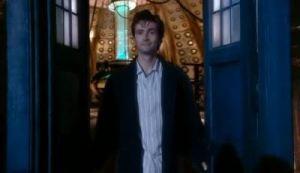
Of course, when I watch “The Christmas Invasion” now I find it to be a lot of fun, although the clear highlight is the entire final sequence involving the Doctor’s takedown of the Sycorax, particularly the way writer Russel T. Davies used the Tardis’ auto-translation matrix to signal the Doctor’s arrival. Upon first view, though, I just wanted my Doctor back. What I learned rather quickly though is that with these transitions the moment you can truly move on is once the new Doctor does something that the prior Doctor couldn’t do. For me, it happened when Tennant had to play Cassandra possessing the Doctor’s body in “New Earth.” It was just so purely funny watching Tennant marvel about how the two hearts in the Doctor’s chest were “beating out a samba,” and it was so unlike something they could have done with Eccleston. From that point on, I was on board with the new Doctor, and, as is common with most #NewToWho stories, I binge-watched the hell out of seasons 2 and 3, sadly forced from that point forward to wait for new episodes throughout season 4 and the David Tennant specials. Such waiting did help me better understand my best friend’s joke that if she had a time machine one thing she’d do right away would be traveling to the future to watch all of the new episodes of Doctor Who (I’d tease her that this was such a sad use of time machine, but then I’d ask if she’d take me with her).
I Was Wrong About “The Eleventh Hour”
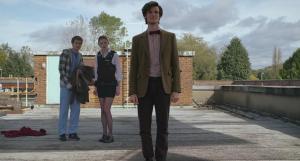
So, “The Eleventh Hour” with Matt Smith was the first time I’d actually been through the months and months of speculation and expectations that greet every Doctor transition on the show. However, although I wasn’t watching it in binge-fashion history basically repeated itself: much as I had with “The Christmas Invasion,” my main takeaway from “Eleventh Hour” was mostly that I just wanted my Doctor back. And, again just like “The Christmas Invasion,” I look back it now and wonder what the heck I was thinking. “The Elevent Hour” is quite easily one of the best “New Doctor” episodes in the entire 50+ history of Doctor Who, and it so clearly functioned as a complete re-set of the show, forgetting everything from the Russell T. Davies era and kicking off the Steven Moffat era in style. Everytime I watch it I am blown away by Matt Smith’s big speech to the bad guy, and his brilliant, “I’m the Doctor. So, basically, run.”
I’m Probably Wrong About “Deep Breath”
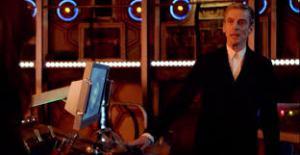
I tell you all of this to provide context to my following statement: I didn’t like “Deep Breath.” Correction: I didn’t like Peter Capaldi’s Doctor. No, unlike many reviewers I was not won over by Capaldi from the moment he uttered his first line, “Shush!” What others have called “a bravura performance” (io9.com) I saw as being overly jarring (and not just because of his sometimes-hard-to-understand Scottish accent), clearly an actor who is still finding his way through the role, failing in his Matt Smith impression during the episode’s overly goofy first quarter but finding little moments of triumph after that, such as his scene with the horrified tramp and description of his “attack eyebrows.” Capaldi has actually admitted in interviews that even after having completed the season he feels as if they are still searching for the right approach to the character. Such statements have largely been written off as Capaldi being too critical of himself due to his lifelong Doctor Who fandom.
The Plot
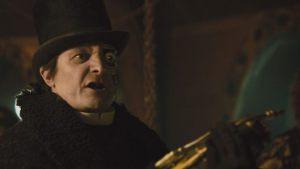
As with most first Doctor stories, the plot is mostly an afterthought. As FilmSchoolRejects argued, “Deep Breath” comes off as an exercise in Steven Moffat deciding upon a theme and then searching for a plot, throwing in a new version of the “Girl in the Fireplace” robots as well as Jenny and Vastra because they are all in some way masking themselves in order to fit in better. That fits quite nicely with the idea of the Doctor having masked his true self with his younger faces as Tennant and Smith. The thematic connection between the Doctor and the villains is made quite clear during the episode’s final controntation. The Doctor forces The Faceless Man(Peter Ferdinando) to look into a mirror to ponder whether or not he even remembers where he stole his face from, but then the Doctor notices own reflection on the back of the mirror, emphasizing that he too doesn’t actually remember where his own face came from (we know it’s from Capaldi’s “Fires of Pompeii” character, but the Doctor recognizes the face but can’t quite place it).
However, unlike FSR I didn’t actually see this likely reverse engineered plot as a weakness because the thematic resonance actually worked for me. Plus, the work of diretor Ben Wheatley and the show’s various arts departments turned these new robots into genuinely creepy, memorable villains. Moreover, Moffat is kind of repeating himself with the notion of holding your breath to neutralize the bad guys (first blinking, now deep breaths, what next?), but though familiar it’s still effectively tense watching poor Clara attempt her escape while holding her breath.
Poor Clara
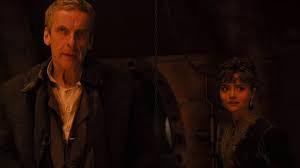
The notion of Clara struggling to adjust to the new Doctor is roughly similar to what Russel T. Davies did with Rose in “The Christmas Invasion,” as “Deep Breath” also similarly holds back the Doctor and emphasizes the companion, in this case Clara. As countless others (including Will Wheaton, of all people, on Hardwick’s after-show) have observed, this is the most obvious route to take in a “New Doctor” episode because it makes the companion an audience surrogate character who is struggling to adjust to everything just as we are. The difference here, though, is that Rose was taken completely by surprise whereas Clara, by virtue of her interactions with the Doctor’s entire history through “Name of the Doctor” into the 50th Anniversary Special, is fully aware of the Doctor’s built-in reset button. So, I didn’t expect her to struggle as much with it, although I should have considering how desperately she begs Matt Smith’s Doctor not to go immediately prior to his regeneration in “Time of the Doctor.”
The idea, of course, is that Clara struggles because despite her protests to the contrary she thought of the Matt Smith Doctor as being her boyfriend, and now he’s gone. Indeed, the episode seems to almost go out of its way to disabuse us of the entire idea of the Doctor being anyone’s boyfriend (screw you Rose, Martha, Amy, Clara) while also holding the Doctor (and possibly the show itself) accountable for encouraging such thoughts, which inspired a round of applause from DenOfGeek and a too-meta-for-his-own-good analysis from ScreenCrush’s Ryan McGee. However, my main reaction is that this would have been far more effective if Moffat and company had done a better job of establishing that there was supposed to be something romantic going on between the Matt Smith Doctor and Clara. It was kind of there, but then it would go away again, to the point that when Clara admitted in “Time of the Doctor” that she travels with the Doctor because she secretly fancies him I was slightly taken aback.
However, beyond that there is something oddly cruel about the way Moffat treats Clara in this episode, as it it is not so much Capaldi who has to prove he’s worthy of playing the Doctor but Jenna Coleman who’s forced to prove she’s worthy of being his companion even though surely she’s proven that by now, right? Vastra sits in judgment of her, the Doctor straight up abandons her (repeatedly), etc. Thankfully, much as she did in the 50th anniversary special and “Time of the Doctor” Coleman brings her A-game, elevating her somewhat overwritten, awkwardly edited confrontation with Vastra and kind of stealing Capaldi’s thunder in the way she outwitted the Faceless Man.
Doctor Who has come under fire in recent years for its treatment of female characters and employment of females behind the scenes, with some likely seeing the hiring of Rachel Talalay to direct multiple season 8 episodes as a reaction to that. Most of this vitriol is directed at Steven Moffat, who many see as having proven through Doctor Who and Sherlock that any complex and engaging female character he crafts will eventually become marginalized, made mere footnotes or catalysts to the male characters. I don’t know how much I buy all of that, but as it pertains to Clara it does kind of seem as if she was more of a plot device than a character during season 7, yet another mysterious female for the Doctor to solve. So, it seems as if Moffat made it a goal with “Deep Breath” to reveal heretofore unexplored depths within Clara, and to deepen her by showing her utilizing a lesson learned from her real life as a school teacher to help save her life while stalling for the Doctor.
A Bit of a Sylvester McCoy Vibe
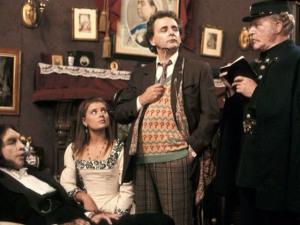
Ace and the Doctor in “Ghost Light,” aka, the most confusing Doctor Who episode of all time
Speaking of which, earlier I said that with Doctor transitions you often can’t really move on until the new guy truly distinguishes himself from his predecessor. I’ve always thought of it in a positive way, though, as in the thing the new Doctor does is awesome. Well, it happened with Capaldi, just not in quite as positive a manner. The moment he left Clara alone with the robots and seemed entirely unapologetic about it was the moment I stopped waiting for Matt Smith’s Doctor. In fact, I hated the new Doctor in the moment because it seemed so entirely unlike something the Doctor would do.
Except, of course, the Doctor’s totally done crap like that before. Heck, it seemed like the Sylvester McCoy Doctor did that to his companion, Ace, at least once every episode. His manipulation of Ace was often borderline ruthless (just see “Ghost Light”), even if he was ultimately doing it as some sort of time travel version of immersion therapy (it’s kind of a long story). That’s the type of Doctor we’ve had in the past, not to mention the easy-to-hate Colin Baker and brilliantly bizarre Tom Baker. So, my problem might not really be that I don’t see the Doctor from Peter Capaldi yet; it might be more that I’d forgotten what the Doctor used to be like before the prolonged period of immense lovability provided by the dashing Tennant and boyish Smith. This new Doctor may have straight up pushed a robot to his death, albeit a robot attempting to flee in a balloon made of human skin, and despite his dialog about it being against his programming this look he gave the camera sure didn’t scream that he felt at all bad for having any part in the death of the Faceless Man:
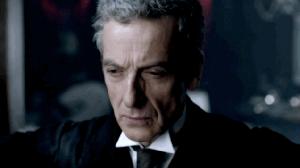
Both the Doctor seemingly abandoning Clara and helping to kill the Faceless Man introduces a new degree of uncertainty into the show, which after the rather hit-and-miss season 7 is the right direction to go. As Steven Moffat told Doctor Who Magazine:
All shows age and they all age sort of in the same way. You learn how to do it, you get really slick at it, and then you think you’re really, really slick at it and everyone’s started to yawn. And you think ‘oh God, we’re really slick at this but everyone knows what we’re going to do’… So now we’ve got to actually get a bit raw at it and do it in a different direction. It happens on every show – you get good at it and ‘good at it’ is the enemy in the end.”
“Deep Breath” is a clear indication of their intention to shake up the formula, take their time a little more, extend scenes a little longer than usual, downplay Murray Gold’s normally boisterous musical cues which had become so commonplace you could usually set your watch to when exactly the thumping Matt Smith Doctor theme would play in each episode, etc.
It’s like I intellectually get and appreciate all of that while at the same time fearing a version of Doctor Who featuring a Doctor who I may not actually find instantly likable. The counterpoint to that is in the form of Capaldi’s final scene with Clara, in which he does kind of break your heart when explaining how horrible it feels that she looks at him and still cannot see him. This suggests, as basically outright stated in Matt Smith’s phone call, that this Doctor’s gruffness simply masks a vulnerability, and that he needs Clara more than she needs him. Doesn’t that sound exactly like the Doctor?
NOTES:
1. Lot of hate being thrown the Paternoster Gang’s way from fans and reviewers, mostly amounting to them being one-note characters who’ve gone stale. Eh. I laughed out loud when Strax threw the newspaper at Clara’s face and when Vastra justified Jenny’s needless posing with a knowingly crappy explanation, “Art?” Plus, while Strax remains pure one-note comic relief “Deep Breath” did attempt to reveal more about Jenny and Vastra’s relationship, even giving us a nonchalant girl-on-girl kiss (eh, kind of).
2. As for Missy (Michelle Gomez), aka, crazy stalker lady in “Paradise” at the end, she is yet another Moffat mystery the internet will probably fail to solve. Is she somehow the Tardis? Um, probably not, Will Wheaton. Is she the Master? Well, Moffat has said they were not doing the Master this season, and we assume anything he says is a lie. Or did he double bluff us? Is she…the Rani? Ding-ding-ding. That’s my guess.
3. In the Moffat era, Doctor Who is often guilty for better or worse of simply being about itself, be it in-jokes about Matt Smith’s wig in “Time of the Doctor” or making the actual title of the show the inspiration for a season-long story arc which would see Matt Smith bouncing about the Tardis and gleefuly exclaiming, “Doctor…Who?” Season 8 is going to be no different, with “Deep Breath” openly acknowledging the whole “Peter Capaldi’s already been on this show as a different character” conundrum. Plus, its plot revisits “Girl in the Fireplace” just as next week’s episode appears set to somehow revisit the season 1 episode “Dalek.” I’ll admit this sometimes annoys me, but I am optimistic about where they might go with it this season.
4. Darn you, internet! Why did you have to so widely spoil Matt Smith’s “suprise” cameo in this episode? Or, more accurately, why didn’t Doctor Who do a better job of keeping that a secret? We’ve known it about since the day they filmed that actual scene with Clara and the Doctor in Glasgow. That all being said, others have argued the scene was entirely unnecessarily or further proof of how the Smith Doctor manipulates those around him (sometimes without realizing it). I would argue it actually made the entire episode.
5. With Coleman’s performance in “Deep Breath” and obviously fun comedic timing with Capaldi I’m getting the impression that we’re going to really miss her if she does actually leave the show after the 2014 Christmas special.
NEXT TIME ON DOCTOR WHO

